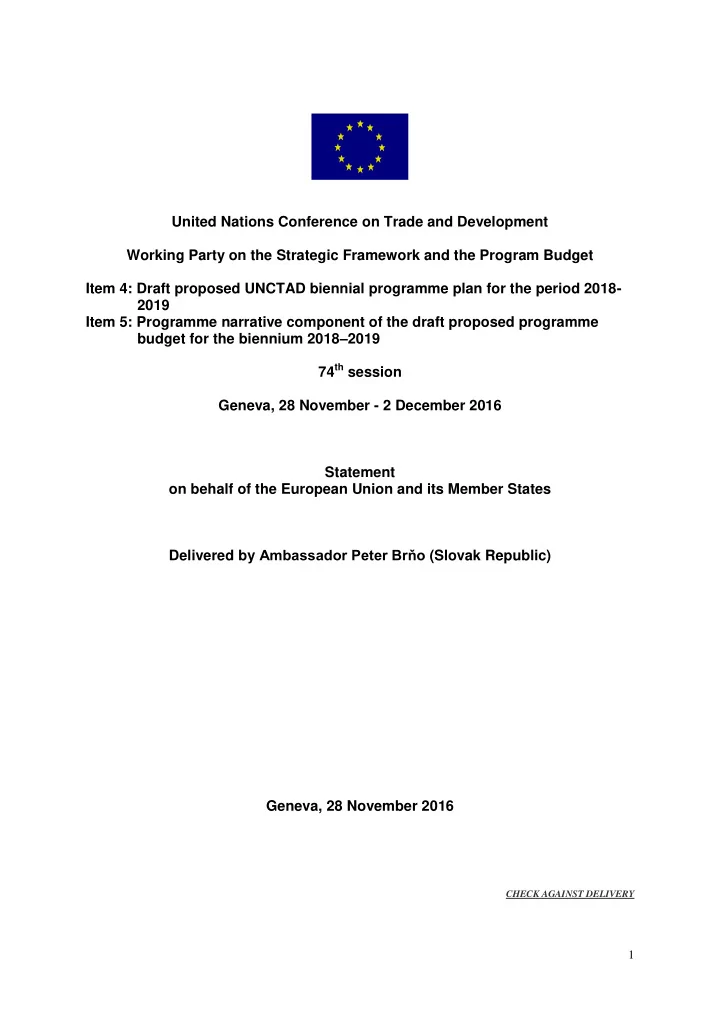

United Nations Conference on Trade and Development Working Party on the Strategic Framework and the Program Budget Item 4: Draft proposed UNCTAD biennial programme plan for the period 2018- 2019 Item 5: Programme narrative component of the draft proposed programme budget for the biennium 2018 – 2019 74 th session Geneva, 28 November - 2 December 2016 Statement on behalf of the European Union and its Member States Delivered by Ambassador Peter Brňo (Slovak Republic) Geneva, 28 November 2016 CHECK AGAINST DELIVERY 1
UNCTAD Working Party on the Strategic Framework and the Program Budget (Draft proposed UNCTAD biennial programme plan for the period 2018-2019, Programme narrative component of the draft proposed programme budget for the biennium 2018 – 2019) 74 th session Geneva, 28 November - 2 December 2016 EU Statement Mme/Mr Chair, Excellencies, distinguished colleagues, ladies and gentlemen, I have the honour to speak on behalf of the European Union and its member states. At the outset, we would like to congratulate you, Mme/Mr Chair, on your election as Chair of this 74 th session of the Working Party on the Strategic Framework and the Program Budget. We would like to thank the Secretariat for preparing this session and the proposed UNCTAD biennial programme plan for the period 2018-2019, including its narrative component. We thoroughly studied these documents and would like to make the following observations. The EU and its member states would like to reiterate the importance we attach to the Working Party strengthening and updating the programme of work of the organization and ensuring the faithful translat ion of UNCTAD’s core mandate into its draft biennial programme plan. We feel that the mandate for the next biennium has been clearly set in the Nairobi Maafikiano. It is time to turn the 2
discussions and the adopted document into action and work together to enhance UNCTAD’s role, impact and institutional effectiveness. Let me draw your attention to several general aspects regarding the draft proposed biennial Programme Plan for 2018 – 2019 and its narrative component: First of all, we fully agree that the main objective of the programme implemented by UNCTAD is to assist developing countries, especially the least developed countries, and countries with economies in transition in integrating beneficially into the global economy in support of inclusive and sustainable growth and development. UNCTAD should help to implement the global development agenda, including the 2030 Agenda for sustainable development and the Addis Ababa Action Agenda. UNCTAD’s activities should remain focused on its “core” mandate in order to avoid any overlap with the mandates of other international organisations and concentrate on areas where it has built a competitive advantage. We would like also to stress that the suggested Biennial Programme Plan should be in line with the outcomes of the fourteenth session of the United Nations Conference on Trade and Development – the “ Nairobi Maafikiano ” as it was already agreed in the conclusions adopted by the Working Party at its seventy-second session last year. The EU and its Member states welcome the focus on mainstreaming cross- cutting issues, including the gender equality and the empowerment of women. As there is a strong mandate from Nairobi to reinforce the work on the links between gender equality, women's and girls' empowerment and trade and development, we were disappointed to notice that reference to these issues and projected outputs are included only in Sub-programme 3 and in one case also in 3
Sub-programme 2. We recommend mainstreaming this issue also in the other subprograms. At the same time, we would like to see the resources from the regular budget for the gender-work under Sub-programme 3 to be strengthend in order to allow the programme to respond to the new mandate. We also welcome strengthening and enhancing the accountability, efficiency and effectiveness of the work of UNCTAD, including through results-based management. We believe that there is further room for improvement and encourage UNCTAD to continue building upon the specific measures taken by the Secretariat and to inform member states on a regular basis. UNCTAD should strengthen its work on enhancing development gains from the digital economy and e-commerce through policy analysis, national information and communications technology policy reviews, capacity-building in this area and through the development of “ eTrade for All ” as it is stipulated in the Nairobi Maafikiano. We support all actions in the programme oriented to implementation of this role of UNCTAD. As I mentioned earlier the Biennial Programme Plan should be in line with the “Nairobi Maafikiano” . In this regard we would like to ask the Secretariat to clarify the inclusion into the Programme narrative component of some items 1 , namely illicit financial flows, sovereign debt restructuring, advisory services to Group of 20 and official debt renegotiations, which are in our opinion beyond the mandate given by the Nairobi Maafikiano. In particular this should include an indication and reference whether these subjects are newly mandated by the Maafikiano, or strengthened or just maintained by it. In the absence of sufficient further explanations on these and other items discussed in the upcoming 1 Doc. TD/B/WP(74)/CRP.3 - p. 8 item 9, p. 9 items 24, 25, 30, p. 11 items 74, 75, 76, 77, p. 12 items 84, 90 4
presentations we would need to request the Secretariat to remove these items from the programme. Mme/Mr Chair, The EU and its MS look forward to the presentations by the different divisions for each Sub-programme and we will raise further questions and specific comments where necessary. Indeed we all share a common objective: making sure resources are optimized for and focused on the benefit of sustainable development. We look forward to a constructive and fruitful meeting under your guidance. Thank you for your attention. 5
Recommend
More recommend